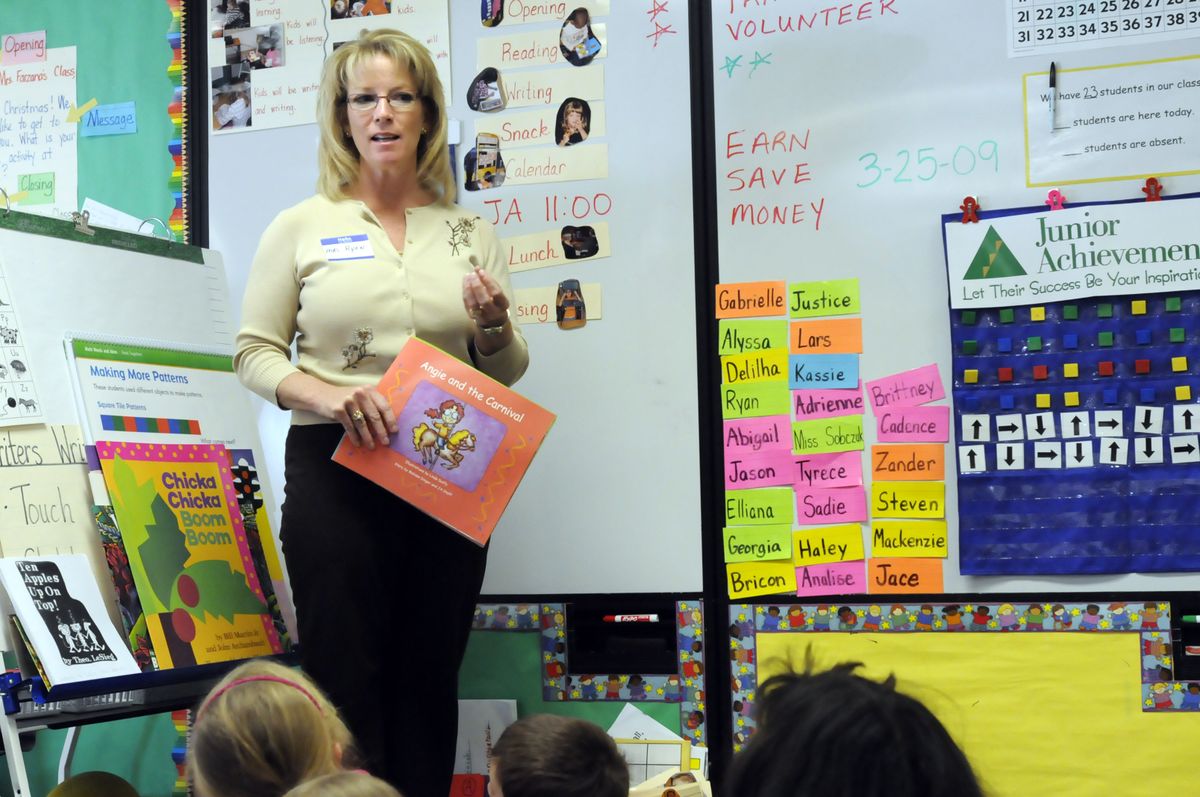Elementary business
Junior Achievement starts early with finance basics

In these challenging economic times, knowing how to manage money can mean the difference between financial solvency and financial ruin.
Junior Achievement, an international nonprofit organization, believes teaching children to be financially literate today ensures our global economy will be in good hands tomorrow.
Locally, Junior Achievement serves several counties in Eastern Washington and North Idaho. “Our mission is to teach kids in grades K-12 about business and economics,” said Suzie Seefried, president of Junior Achievement of the Inland Northwest.
While some may wonder what a kindergartner can learn about finance, the children in Emily Sobczuk’s classroom at Holmes Elementary School recently proved to be eager participants. In fact, of the 10,500 area students who participated in Junior Achievement in 2007-’08, the majority were in elementary school.
“We start very young, teaching kids the economics of life,” Seefried said. Elementary students receive small banks and learn money-saving strategies. Volunteers from businesses throughout the community teach the classes. “We train our volunteers and give them a briefcase with all the materials they need,” Seefried said.
Janet Camp, a former high school teacher, has taught a Junior Achievement class to first-graders at Holmes for several years.
“We start by discussing needs verses wants,” Camp said.
“Most of them think television is a need. I’m able to explain that you won’t die without a television.”
At Holmes, more than 90 percent of students qualify for free or reduced-price lunch. “For some of these kids, a house is on their want list. Some of them are living in shelters,” Camp said.
Classroom volunteers stress the importance of education. Holmes Principal Steve Barnes appreciates the way the program “connects the real world to what we do in school.”
Stevens Elementary School Principal Mike Crabtree agreed, “JA supports our district and state goals. The program helps students to understand the purpose of school and homework.”
Volunteers like Michael Jackson, a partner at Morgan Stanley in Spokane, share their own stories with students. “Our future is our children,” Jackson said. “And our future success is in how well they are educated.”
Students aren’t the only ones who benefit from the program.
“Our volunteers gain as much as the students,” Seefried said.
Jackson agreed. Though he now serves on the Junior Achievement board, he misses the classroom interaction.
“I enjoyed seeing the kids grasp these concepts,” he said. “You can see a fire start.”
That enthusiasm has kept Len Renner, vice president of Bank of America Commercial Bank, volunteering for 21 years. “Banking is what I do,” he said, “but working with kids and being in the education arena is my second passion.”
Renner teaches a six-week Junior Achievement class to eighth-graders at All Saints Catholic School. His economics for success course encompasses everything from discovering the students’ interests and aptitudes to budgeting.
Renner said he wants students to remember two things. “Number one: Live within your means and try to save money, and number two: pay your bills on time, and the easiest way to do that is not to get into credit card trouble.”
Teachers and administrators are pleased with the partnership the schools have developed with Junior Achievement. Dave Jackson, a teacher at Lewis and Clark High School, said, “I’m impressed with the people who donate their valuable time to do this.”
A real-life perspective offered by local executives, business owners and bankers has a profound impact on the students.
“They look forward to having that professional come once a week,” Jackson said. “You can see the kids really listening.”
The high school curriculum covers a wealth of material from interview and resume-writing skills to starting and running a business. Students also get to job shadow at area businesses. Said Laine Hamacher, a senior at Lewis and Clark: “We got to create a company. We created LC decals and sold them to the students.”
That taste of entrepreneurship can have a lasting effect. In a recent television interview, Junior Achievement president and CEO Sean Rush said, “Students who’ve gone through JA programs are 30 percent more likely to start a business or engage in a business than the general population.”
Some Junior Achievement students don’t wait for college or adulthood to launch their own businesses. Christian Wright, a sophomore at Cheney High School, took his first Junior Achievement class in kindergarten and started his own business by age 12. “It’s called ABC, Art By Christian,” he said. “I sell jewelry I design myself.”
“Junior Achievement allows students to think big,” Seefried said, and Wright certainly did. But even he was surprised when his jewelry business led to an appearance on the Today Show. The show profiled young entrepreneurs and they had heard about Wright through Junior Achievement. In February 2008, he was flown to New York and taken by limo to the studio. He laughed when he described a sale he made as a result. “Meredith Vieira bought my earrings!”
Wright has already started a second business. “It’s a janitorial business,” he said. “JA taught me I can do anything I put my mind to.” Wright certainly learned excellent money management skills. He said, “I still have Meredith Vieira’s $20 bill.”